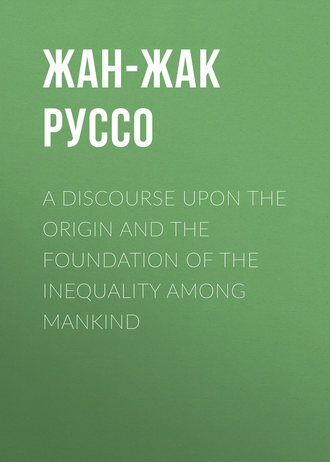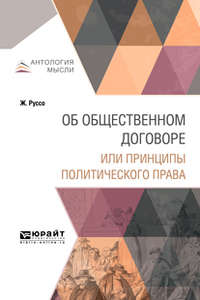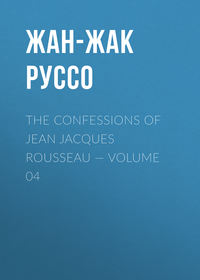 полная версия
полная версияA Discourse Upon the Origin and the Foundation of the Inequality Among Mankind
I stop at these first advances, and beseech my judges to suspend their lecture a little, in order to consider, what a great way language has still to go, in regard to the invention of physical substantives alone, (though the easiest part of language to invent,) to be able to express all the sentiments of man, to assume an invariable form, to bear being spoken in public and to influence society: I earnestly entreat them to consider how much time and knowledge must have been requisite to find out numbers, abstract words, the aorists, and all the other tenses of verbs, the particles, and syntax, the method of connecting propositions and arguments, of forming all the logic of discourse. For my own part, I am so scared at the difficulties that multiply at every step, and so convinced of the almost demonstrated impossibility of languages owing their birth and establishment to means that were merely human, that I must leave to whoever may please to take it up, the task of discussing this difficult problem. "Which was the most necessary, society already formed to invent languages, or languages already invented to form society?"
But be the case of these origins ever so mysterious, we may at least infer from the little care which nature has taken to bring men together by mutual wants, and make the use of speech easy to them, how little she has done towards making them sociable, and how little she has contributed to anything which they themselves have done to become so. In fact, it is impossible to conceive, why, in this primitive state, one man should have more occasion for the assistance of another, than one monkey, or one wolf for that of another animal of the same species; or supposing that he had, what motive could induce another to assist him; or even, in this last case, how he, who wanted assistance, and he from whom it was wanted, could agree among themselves upon the conditions. Authors, I know, are continually telling us, that in this state man would have been a most miserable creature; and if it is true, as I fancy I have proved it, that he must have continued many ages without either the desire or the opportunity of emerging from such a state, this their assertion could only serve to justify a charge against nature, and not any against the being which nature had thus constituted; but, if I thoroughly understand this term miserable, it is a word, that either has no meaning, or signifies nothing, but a privation attended with pain, and a suffering state of body or soul; now I would fain know what kind of misery can be that of a free being, whose heart enjoys perfect peace, and body perfect health? And which is aptest to become insupportable to those who enjoy it, a civil or a natural life? In civil life we can scarcely meet a single person who does not complain of his existence; many even throw away as much of it as they can, and the united force of divine and human laws can hardly put bounds to this disorder. Was ever any free savage known to have been so much as tempted to complain of life, and lay violent hands on himself? Let us therefore judge with less pride on which side real misery is to be placed. Nothing, on the contrary, must have been so unhappy as savage man, dazzled by flashes of knowledge, racked by passions, and reasoning on a state different from that in which he saw himself placed. It was in consequence of a very wise Providence, that the faculties, which he potentially enjoyed, were not to develop themselves but in proportion as there offered occasions to exercise them, lest they should be superfluous or troublesome to him when he did not want them, or tardy and useless when he did. He had in his instinct alone everything requisite to live in a state of nature; in his cultivated reason he has barely what is necessary to live in a state of society.
It appears at first sight that, as there was no kind of moral relations between men in this state, nor any known duties, they could not be either good or bad, and had neither vices nor virtues, unless we take these words in a physical sense, and call vices, in the individual, the qualities which may prove detrimental to his own preservation, and virtues those which may contribute to it; in which case we should be obliged to consider him as most virtuous, who made least resistance against the simple impulses of nature. But without deviating from the usual meaning of these terms, it is proper to suspend the judgment we might form of such a situation, and be upon our guard against prejudice, till, the balance in hand, we have examined whether there are more virtues or vices among civilized men; or whether the improvement of their understanding is sufficient to compensate the damage which they mutually do to each other, in proportion as they become better informed of the services which they ought to do; or whether, upon the whole, they would not be much happier in a condition, where they had nothing to fear or to hope from each other, than in that where they had submitted to an universal subserviency, and have obliged themselves to depend for everything upon the good will of those, who do not think themselves obliged to give anything in return.
But above all things let us beware concluding with Hobbes, that man, as having no idea of goodness, must be naturally bad; that he is vicious because he does not know what virtue is; that he always refuses to do any service to those of his own species, because he believes that none is due to them; that, in virtue of that right which he justly claims to everything he wants, he foolishly looks upon himself as proprietor of the whole universe. Hobbes very plainly saw the flaws in all the modern definitions of natural right: but the consequences, which he draws from his own definition, show that it is, in the sense he understands it, equally exceptionable. This author, to argue from his own principles, should say that the state of nature, being that where the care of our own preservation interferes least with the preservation of others, was of course the most favourable to peace, and most suitable to mankind; whereas he advances the very reverse in consequence of his having injudiciously admitted, as objects of that care which savage man should take of his preservation, the satisfaction of numberless passions which are the work of society, and have rendered laws necessary. A bad man, says he, is a robust child. But this is not proving that savage man is a robust child; and though we were to grant that he was, what could this philosopher infer from such a concession? That if this man, when robust, depended on others as much as when feeble, there is no excess that he would not be guilty of. He would make nothing of striking his mother when she delayed ever so little to give him the breast; he would claw, and bite, and strangle without remorse the first of his younger brothers, that ever so accidentally jostled or otherwise disturbed him. But these are two contradictory suppositions in the state of nature, to be robust and dependent. Man is weak when dependent, and his own master before he grows robust. Hobbes did not consider that the same cause, which hinders savages from making use of their reason, as our jurisconsults pretend, hinders them at the same time from making an ill use of their faculties, as he himself pretends; so that we may say that savages are not bad, precisely because they don't know what it is to be good; for it is neither the development of the understanding, nor the curb of the law, but the calmness of their passions and their ignorance of vice that hinders them from doing ill: tantus plus in illis proficit vitiorum ignorantia, quam in his cognito virtutis. There is besides another principle that has escaped Hobbes, and which, having been given to man to moderate, on certain occasions, the blind and impetuous sallies of self-love, or the desire of self-preservation previous to the appearance of that passion, allays the ardour, with which he naturally pursues his private welfare, by an innate abhorrence to see beings suffer that resemble him. I shall not surely be contradicted, in granting to man the only natural virtue, which the most passionate detractor of human virtues could not deny him, I mean that of pity, a disposition suitable to creatures weak as we are, and liable to so many evils; a virtue so much the more universal, and withal useful to man, as it takes place in him of all manner of reflection; and so natural, that the beasts themselves sometimes give evident signs of it. Not to speak of the tenderness of mothers for their young; and of the dangers they face to screen them from danger; with what reluctance are horses known to trample upon living bodies; one animal never passes unmoved by the dead carcass of another animal of the same species: there are even some who bestow a kind of sepulture upon their dead fellows; and the mournful lowings of cattle, on their entering the slaughter-house, publish the impression made upon them by the horrible spectacle they are there struck with. It is with pleasure we see the author of the fable of the bees, forced to acknowledge man a compassionate and sensible being; and lay aside, in the example he offers to confirm it, his cold and subtle style, to place before us the pathetic picture of a man, who, with his hands tied up, is obliged to behold a beast of prey tear a child from the arms of his mother, and then with his teeth grind the tender limbs, and with his claws rend the throbbing entrails of the innocent victim. What horrible emotions must not such a spectator experience at the sight of an event which does not personally concern him? What anguish must he not suffer at his not being able to assist the fainting mother or the expiring infant?
Such is the pure motion of nature, anterior to all manner of reflection; such is the force of natural pity, which the most dissolute manners have as yet found it so difficult to extinguish, since we every day see, in our theatrical representation, those men sympathize with the unfortunate and weep at their sufferings, who, if in the tyrant's place, would aggravate the torments of their enemies. Mandeville was very sensible that men, in spite of all their morality, would never have been better than monsters, if nature had not given them pity to assist reason: but he did not perceive that from this quality alone flow all the social virtues, which he would dispute mankind the possession of. In fact, what is generosity, what clemency, what humanity, but pity applied to the weak, to the guilty, or to the human species in general? Even benevolence and friendship, if we judge right, will appear the effects of a constant pity, fixed upon a particular object: for to wish that a person may not suffer, what is it but to wish that he may be happy? Though it were true that commiseration is no more than a sentiment, which puts us in the place of him who suffers, a sentiment obscure but active in the savage, developed but dormant in civilized man, how could this notion affect the truth of what I advance, but to make it more evident. In fact, commiseration must be so much the more energetic, the more intimately the animal, that beholds any kind of distress, identifies himself with the animal that labours under it. Now it is evident that this identification must have been infinitely more perfect in the state of nature than in the state of reason. It is reason that engenders self-love, and reflection that strengthens it; it is reason that makes man shrink into himself; it is reason that makes him keep aloof from everything that can trouble or afflict him: it is philosophy that destroys his connections with other men; it is in consequence of her dictates that he mutters to himself at the sight of another in distress, You may perish for aught I care, nothing can hurt me. Nothing less than those evils, which threaten the whole species, can disturb the calm sleep of the philosopher, and force him from his bed. One man may with impunity murder another under his windows; he has nothing to do but clap his hands to his ears, argue a little with himself to hinder nature, that startles within him, from identifying him with the unhappy sufferer. Savage man wants this admirable talent; and for want of wisdom and reason, is always ready foolishly to obey the first whispers of humanity. In riots and street-brawls the populace flock together, the prudent man sneaks off. They are the dregs of the people, the poor basket and barrow-women, that part the combatants, and hinder gentle folks from cutting one another's throats.
It is therefore certain that pity is a natural sentiment, which, by moderating in every individual the activity of self-love, contributes to the mutual preservation of the whole species. It is this pity which hurries us without reflection to the assistance of those we see in distress; it is this pity which, in a state of nature, stands for laws, for manners, for virtue, with this advantage, that no one is tempted to disobey her sweet and gentle voice: it is this pity which will always hinder a robust savage from plundering a feeble child, or infirm old man, of the subsistence they have acquired with pain and difficulty, if he has but the least prospect of providing for himself by any other means: it is this pity which, instead of that sublime maxim of argumentative justice, Do to others as you would have others do to you, inspires all men with that other maxim of natural goodness a great deal less perfect, but perhaps more useful, Consult your own happiness with as little prejudice as you can to that of others. It is in a word, in this natural sentiment, rather than in fine-spun arguments, that we must look for the cause of that reluctance which every man would experience to do evil, even independently of the maxims of education. Though it may be the peculiar happiness of Socrates and other geniuses of his stamp, to reason themselves into virtue, the human species would long ago have ceased to exist, had it depended entirely for its preservation on the reasonings of the individuals that compose it.
With passions so tame, and so salutary a curb, men, rather wild than wicked, and more attentive to guard against mischief than to do any to other animals, were not exposed to any dangerous dissensions: As they kept up no manner of correspondence with each other, and were of course strangers to vanity, to respect, to esteem, to contempt; as they had no notion of what we call Meum and Tuum, nor any true idea of justice; as they considered any violence they were liable to, as an evil that could be easily repaired, and not as an injury that deserved punishment; and as they never so much as dreamed of revenge, unless perhaps mechanically and unpremeditatedly, as a dog who bites the stone that has been thrown at him; their disputes could seldom be attended with bloodshed, were they never occasioned by a more considerable stake than that of subsistence: but there is a more dangerous subject of contention, which I must not leave unnoticed.
Among the passions which ruffle the heart of man, there is one of a hot and impetuous nature, which renders the sexes necessary to each other; a terrible passion which despises all dangers, bears down all obstacles, and to which in its transports it seems proper to destroy the human species which it is destined to preserve. What must become of men abandoned to this lawless and brutal rage, without modesty, without shame, and every day disputing the objects of their passion at the expense of their blood?
We must in the first place allow that the more violent the passions, the more necessary are laws to restrain them: but besides that the disorders and the crimes, to which these passions daily give rise among us, sufficiently grove the insufficiency of laws for that purpose, we would do well to look back a little further and examine, if these evils did not spring up with the laws themselves; for at this rate, though the laws were capable of repressing these evils, it is the least that might be expected from them, seeing it is no more than stopping the progress of a mischief which they themselves have produced.
Let us begin by distinguishing between what is moral and what is physical in the passion called love. The physical part of it is that general desire which prompts the sexes to unite with each other; the moral part is that which determines that desire, and fixes it upon a particular object to the exclusion of all others, or at least gives it a greater degree of energy for this preferred object. Now it is easy to perceive that the moral part of love is a factitious sentiment, engendered by society, and cried up by the women with great care and address in order to establish their empire, and secure command to that sex which ought to obey. This sentiment, being founded on certain notions of beauty and merit which a savage is not capable of having, and upon comparisons which he is not capable of making, can scarcely exist in him: for as his mind was never in a condition to form abstract ideas of regularity and proportion, neither is his heart susceptible of sentiments of admiration and love, which, even without our perceiving it, are produced by our application of these ideas; he listens solely to the dispositions implanted in him by nature, and not to taste which he never was in a way of acquiring; and every woman answers his purpose.
Confined entirely to what is physical in love, and happy enough not to know these preferences which sharpen the appetite for it, at the same time that they increase the difficulty of satisfying such appetite, men, in a state of nature, must be subject to fewer and less violent fits of that passion, and of course there must be fewer and less violent disputes among them in consequence of it. The imagination which causes so many ravages among us, never speaks to the heart of savages, who peaceably wait for the impulses of nature, yield to these impulses without choice and with more pleasure than fury; and whose desires never outlive their necessity for the thing desired.
Nothing therefore can be more evident, than that it is society alone, which has added even to love itself as well as to all the other passions, that impetuous ardour, which so often renders it fatal to mankind; and it is so much the more ridiculous to represent savages constantly murdering each other to glut their brutality, as this opinion is diametrically opposite to experience, and the Caribbeans, the people in the world who have as yet deviated least from the state of nature, are to all intents and purposes the most peaceable in their amours, and the least subject to jealousy, though they live in a burning climate which seems always to add considerably to the activity of these passions.
As to the inductions which may be drawn, in respect to several species of animals, from the battles of the males, who in all seasons cover our poultry yards with blood, and in spring particularly cause our forests to ring again with the noise they make in disputing their females, we must begin by excluding all those species, where nature has evidently established, in the relative power of the sexes, relations different from those which exist among us: thus from the battle of cocks we can form no induction that will affect the human species. In the species, where the proportion is better observed, these battles must be owing entirely to the fewness of the females compared with the males, or, which is all one, to the exclusive intervals, during which the females constantly refuse the addresses of the males; for if the female admits the male but two months in the year, it is all the same as if the number of females were five-sixths less than what it is: now neither of these cases is applicable to the human species, where the number of females generally surpasses that of males, and where it has never been observed that, even among savages, the females had, like those of other animals, stated times of passion and indifference, Besides, among several of these animals the whole species takes fire all at once, and for some days nothing is, to be seen among them but confusion, tumult, disorder and bloodshed; a state unknown to the human species where love is never periodical. We can not therefore conclude from the battles of certain animals for the possession of their females, that the same would be the case of man in a state of nature; and though we might, as these contests do not destroy the other species, there is at least equal room to think they would not be fatal to ours; nay it is very probable that they would cause fewer ravages than they do in society, especially in those countries where, morality being as yet held in some esteem, the jealousy of lovers, and the vengeance of husbands every day produce duels, murders and even worse crimes; where the duty of an eternal fidelity serves only to propagate adultery; and the very laws of continence and honour necessarily contribute to increase dissoluteness, and multiply abortions.
Let us conclude that savage man, wandering about in the forests, without industry, without speech, without any fixed residence, an equal stranger to war and every social connection, without standing in any shape in need of his fellows, as well as without any desire of hurting them, and perhaps even without ever distinguishing them individually one from the other, subject to few passions, and finding in himself all he wants, let us, I say, conclude that savage man thus circumstanced had no knowledge or sentiment but such as are proper to that condition, that he was alone sensible of his real necessities, took notice of nothing but what it was his interest to see, and that his understanding made as little progress as his vanity. If he happened to make any discovery, he could the less communicate it as he did not even know his children. The art perished with the inventor; there was neither education nor improvement; generations succeeded generations to no purpose; and as all constantly set out from the same point, whole centuries rolled on in the rudeness and barbarity of the first age; the species was grown old, while the individual still remained in a state of childhood.
If I have enlarged so much upon the supposition of this primitive condition, it is because I thought it my duty, considering what ancient errors and inveterate prejudices I have to extirpate, to dig to the very roots, and show in a true picture of the state of nature, how much even natural inequality falls short in this state of that reality and influence which our writers ascribe to it.
In fact, we may easily perceive that among the differences, which distinguish men, several pass for natural, which are merely the work of habit and the different kinds of life adopted by men living in a social way. Thus a robust or delicate constitution, and the strength and weakness which depend on it, are oftener produced by the hardy or effeminate manner in which a man has been brought up, than by the primitive constitution of his body. It is the same thus in regard to the forces of the mind; and education not only produces a difference between those minds which are cultivated and those which are not, but even increases that which is found among the first in proportion to their culture; for let a giant and a dwarf set out in the same path, the giant at every step will acquire a new advantage over the dwarf. Now, if we compare the prodigious variety in the education and manner of living of the different orders of men in a civil state, with the simplicity and uniformity that prevails in the animal and savage life, where all the individuals make use of the same aliments, live in the same manner, and do exactly the same things, we shall easily conceive how much the difference between man and man in the state of nature must be less than in the state of society, and how much every inequality of institution must increase the natural inequalities of the human species.
But though nature in the distribution of her gifts should really affect all the preferences that are ascribed to her, what advantage could the most favoured derive from her partiality, to the prejudice of others, in a state of things, which scarce admitted any kind of relation between her pupils? Of what service can beauty be, where there is no love? What will wit avail people who don't speak, or craft those who have no affairs to transact? Authors are constantly crying out, that the strongest would oppress the weakest; but let them explain what they mean by the word oppression. One man will rule with violence, another will groan under a constant subjection to all his caprices: this is indeed precisely what I observe among us, but I don't see how it can be said of savage men, into whose heads it would be a harder matter to drive even the meaning of the words domination and servitude. One man might, indeed, seize on the fruits which another had gathered, on the game which another had killed, on the cavern which another had occupied for shelter; but how is it possible he should ever exact obedience from him, and what chains of dependence can there be among men who possess nothing? If I am driven from one tree, I have nothing to do but look out for another; if one place is made uneasy to me, what can hinder me from taking up my quarters elsewhere? But suppose I should meet a man so much superior to me in strength, and withal so wicked, so lazy and so barbarous as to oblige me to provide for his subsistence while he remains idle; he must resolve not to take his eyes from me a single moment, to bind me fast before he can take the least nap, lest I should kill him or give him the slip during his sleep: that is to say, he must expose himself voluntarily to much greater troubles than what he seeks to avoid, than any he gives me. And after all, let him abate ever so little of his vigilance; let him at some sudden noise but turn his head another way; I am already buried in the forest, my fetters are broke, and he never sees me again.









